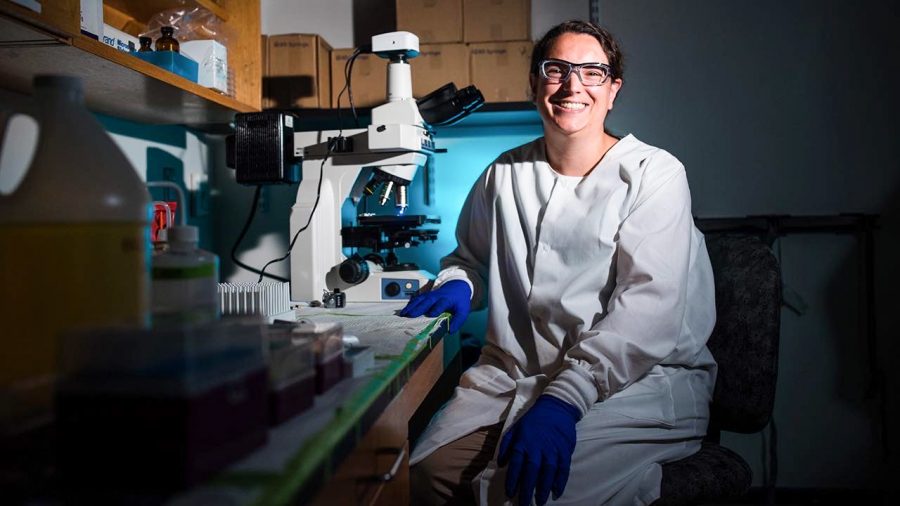Assistant professor Blumer-Schuette recognized by AEM Journal
Courtesy of Oakland University
Sara Blumer-Schuette’s research on how pathogens attach to surfaces will be included in the Applied and Environmental Microbiology journal.
The Applied and Environmental Microbiology (AEM) journal has selected Oakland University assistant professor of biological sciences Sara Blumer-Schuette for a spotlight on her research into how bacteria, including pathogens, attach to surfaces.
The research paper “Caldicellulosiruptor bescii adheres to polysaccharides using a type IV pilin-dependent mechanism” will be published in an upcoming edition of AEM, a peer-reviewed journal published by the American Society for Microbiology.
“It was pretty exciting,” Blumer-Schuette said about having her work in AEM. “It is a renowned journal … They publish a lot of solid, good work, so I was very excited to get this project accepted for publication by AEM.”
The research focuses on the bacteria Caldicellulosiruptor bescii, specifically a type of protein on it called pilins. Pilins are able to attach themselves to cellulose by forming into filaments, allowing the bacteria to break down plant biomass.
The research is important because it figures out how pilins work and what role they play. It is also important because Caldicellulosiruptor bescii — a safe bacteria to work with — has many similarities with disease-causing pathogens like Clostridium difficile (C. diff), Botulism and Gangrene.
“The most direct application of my work would be to engineer better plant biomass degrading bacteria to develop chemicals,” Blumer-Schuette said. “If they are able to adhere to plant biomass, that helps the process of degradation.”
A less direct result of the research is that Caldicellulosiruptor bescii can be used as a safer bacteria to use in pathogen research, meaning researchers do not have to put themselves into harmful situations with dangerous pathogens.
The paper was researched and written with help from graduate students Asma Khan and Valerie Hauk, undergraduate student Mena Ibrahim and OU professor Thomas Raffel.
Blumer-Schuette first became interested in biology in college at Michigan Tech as a chemical engineering major.
“I happened to have a lot of friends that were foresters and they needed to take a botany elective as a part of their degree,” she said. “So, having the greatest logic I decided I wanted to hang out with my friends.”
One of the biologists she studied under was Janice Glime, whom Blumer-Schuette credits as the person who got her interested in biology.
“She shared her passion and excitement about botany with the students,” Blumer-Schuette said. “From that point on, I was hooked. I had never considered biology as a career, per se, but that really impacted my interest in the field.”
The research for the featured research grew out of the founding project of the Blumer-Schuette Lab.
The switch to online learning and Gov. Gretchen Whitmer’s “Stay Home, Stay Safe” order led Blumer-Schuette to stop running experiments for the time being.
“Our wet lab experiments were decelerated as we saw the university sending students home,” Blumer-Schuette said. “The actual hands-on experiments are stopped and now my students are looking at data and writing and thinking about what the data is indicating.”
Blumer-Schuette is unsure when she will resume running experiments.
“I am more waiting on direction from the university’s administration,” she said. “They will let us know when we are able to get back.”






